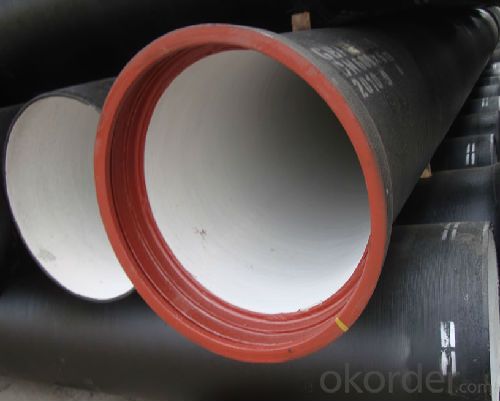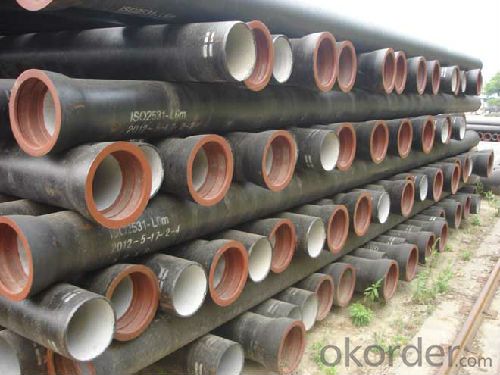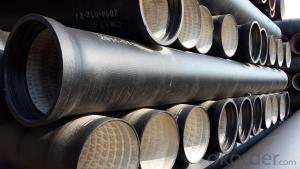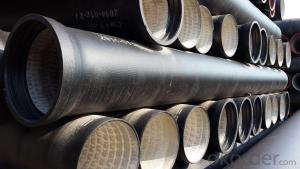Ductile Iron Pipe DN500-DN1000 ISO2531 In Bulk Vessel
- Loading Port:
- China main port
- Payment Terms:
- TT or LC
- Min Order Qty:
- 1000 m.t.
- Supply Capability:
- 300000 m.t./month
OKorder Service Pledge
OKorder Financial Service
You Might Also Like
1.Ductile Iron Pipe Description :
1) Pipes confirm to ISO2531,K9 class,T type joint,6m long,with inside cements lining conform to ISO4179, outside Zinc
spraying(130g/m2) and bitumen coating(70μm) conform to ISO8179.
2) Pipe ends: Spigot and socket ends, with 100% SBR rubber gaskets accoding to ISO4633
3) we can do third party inspection according to customer's request.
2.Main Features of the Ductile Iron Pipe:
1. Material: Ductile iron grade 500-7/ 450-10 in accordance with ISO1083
2. Standard: ISO 2531, EN545, EN598, ANSI, AWWA
3. Certificate: ISO9001, ISO14001, SGS, NSF, WRAS
4. Test: In accordance with ISO 2531 / EN 545 / EN598 and 100% water pressure test
5. Length: 6m or cut into 5.6m, 5.7m, 5.8m
6. Internal Lining: Cement, conform to ISO4179
7. External coating: Zinc + Bitumen, conform to ISO8179
3.Ductile Iron Pipe Images:


4.Ductile Iron Pipe Specification:
Place of Origin: China (Mainland)
Model Number: DN80-1600
Length: 6M/5.7M/NEGOTIATED
Standard: ISO2531 / EN545
Application: Potable/Sewage Water
Diameter: DN80-1600
Shape: Round
Hardness: 230
Pipe Wall Thickness: standerd
Pull Strength: 420
Yield (≥ MPa): 300
5.FAQ:
We have organized several common questions for our clients,may help you sincerely:
1.Q: Why would you choose ductile iron pipe rather than other pipe materials?
A:The reasons are obvious for that not only ductile iron pipe possesses the inherent strength and flexibility of ductile
iron, combined with proven corrosion protection systems, but also the cost savings can be achieved from design to
installation and commissioning.
2.Q:Why can you guarantee the inner of pipes can’t be corroded?
A: High alumina cement mortar lining and sulphate-resistant cement mortar lining. These two special linings are applicable
to inner anti-corrosion for sewage pipes, improving resistance to erosion of the sewage components.
- Q:Can ductile iron pipes be used for trench crossings?
- Yes, ductile iron pipes can be used for trench crossings. Ductile iron pipes are known for their high strength and durability, making them suitable for a wide range of applications including trench crossings. They have the ability to withstand heavy loads and external pressures, making them an ideal choice for underground installations. Additionally, ductile iron pipes have excellent corrosion resistance properties, ensuring their longevity and reliability in trench crossing scenarios.
- Q:Can ductile iron pipes be used for oil and gas pipelines?
- Yes, ductile iron pipes can be used for oil and gas pipelines. Ductile iron is a strong and durable material that is resistant to corrosion, making it suitable for transporting oil and gas over long distances. Additionally, ductile iron pipes have excellent pressure-bearing capabilities, making them capable of withstanding the high pressures often associated with oil and gas transportation. Furthermore, ductile iron pipes are relatively easy to install and maintain, which adds to their suitability for oil and gas pipelines. However, it is important to note that the specific application and conditions of the pipeline must be considered, and consulting with industry experts is recommended to ensure the proper selection and installation of ductile iron pipes for oil and gas transportation.
- Q:How are ductile iron pipes protected against stray current corrosion?
- Ductile iron pipes are protected against stray current corrosion through the implementation of various measures. One common method is the installation of a protective coating, such as an epoxy or zinc coating, on the external surface of the pipes. This coating acts as a barrier, preventing direct contact between the pipe and the surrounding soil or water. Additionally, cathodic protection systems, such as impressed current or sacrificial anode systems, can be employed to further protect the pipes. These systems help to control and redirect stray currents, minimizing their impact on the ductile iron pipes and preventing corrosion.
- Q:How do ductile iron pipes handle ground settlement near construction sites?
- Ductile iron pipes are highly resilient and can withstand ground settlement near construction sites. Due to their flexible nature, these pipes can accommodate small movements and settlement without incurring significant damage or failure. The ductility of the material allows the pipes to bend and adjust to the changing ground conditions, ensuring their integrity and minimizing the risk of leaks or breakage. Additionally, the strong and durable properties of ductile iron make it a reliable choice for underground infrastructure, providing long-term stability even in challenging environments.
- Q:How does ductile iron pipe handle thermal expansion and contraction?
- Ductile iron pipe is able to handle thermal expansion and contraction effectively due to its inherent flexibility and strength. Its unique composition allows it to withstand the expansion and contraction caused by temperature fluctuations without breaking or becoming brittle. This property is crucial in preventing any damage to the pipe or its fittings, ensuring a reliable and durable pipeline system.
- Q:What are the different methods for anchoring ductile iron pipe?
- There are several methods available for anchoring ductile iron pipe, depending on the specific application and requirements. 1. Thrust Blocks: This method involves constructing concrete blocks around the pipe at points where there are changes in direction or changes in pipe diameter. The blocks provide resistance against the thrust forces generated by the flowing water, preventing movement of the pipe. 2. Concrete Collars: Concrete collars or rings can be installed around the pipe at regular intervals to provide additional support and prevent lateral movement. These collars are typically made by pouring concrete into a pre-made mold around the pipe. 3. Pipe Clamps: Pipe clamps are metal brackets that can be attached to the pipe and anchored to a structure or a support system. These clamps come in various sizes and designs, providing flexibility in installation and allowing for adjustment as needed. 4. Pipe Restraints: Pipe restraints are devices specifically designed to restrain the movement of ductile iron pipe. They usually consist of a metal band or collar that is tightened around the pipe and attached to a concrete structure or an anchoring system. 5. Bell and Spigot Joint: The bell and spigot joint itself can act as a means of anchoring the pipe. The bell end of one pipe fits over the spigot end of another, creating a tight connection that helps resist movement. 6. Soil Embedment: Properly compacted soil surrounding the pipe can provide some level of anchoring. The soil should be compacted in layers around the pipe to ensure stability and prevent movement. It is important to note that the selection of the anchoring method depends on factors such as soil conditions, pipe diameter, operating pressure, and location. Consulting industry standards and guidelines, along with the assistance of a qualified engineer, is crucial in determining the appropriate anchoring method for a specific ductile iron pipe installation.
- Q:How do ductile iron pipes handle traffic vibrations?
- Ductile iron pipes are highly resistant to traffic vibrations due to their inherent strength and flexibility. These pipes have the ability to absorb and dissipate the energy generated by traffic vibrations, minimizing any potential damage or stress on the pipes. Additionally, their sturdy construction and high tensile strength make them less susceptible to cracking or breaking under the impact of traffic-induced vibrations. Overall, ductile iron pipes provide excellent performance and durability in handling traffic vibrations.
- Q:How does ductile iron pipe perform in areas with high soil settlement?
- Ductile iron pipes perform well in areas with high soil settlement due to their inherent strength and flexibility. Their ability to withstand soil movement and settlement helps prevent pipe damage or failure. Additionally, ductile iron pipes are designed with joints that allow for some movement, further reducing the risk of cracks or breaks. Overall, ductile iron pipes are a reliable choice for areas prone to high soil settlement.
- Q:Are there any special considerations for installing ductile iron pipe in rocky soils?
- Yes, there are special considerations for installing ductile iron pipe in rocky soils. The presence of rocks can pose challenges during the installation process as they can cause damage to the pipe or impede its proper alignment. Therefore, it is important to carefully assess the soil conditions and rock content at the installation site. Additional measures such as proper bedding and backfilling techniques, using protective coatings or linings, and employing specialized equipment may be necessary to ensure the durability and longevity of the ductile iron pipe in rocky soils.
- Q:How does ductile iron pipe handle soil movement?
- Ductile iron pipe has excellent resistance to soil movement due to its high flexibility and strength. It can withstand ground settlement, soil shifting, and other forms of soil movement without cracking or breaking. The pipe's ductility allows it to absorb the stress and strain caused by soil movement, making it a reliable and durable choice for underground pipelines.
1. Manufacturer Overview |
|
|---|---|
| Location | |
| Year Established | |
| Annual Output Value | |
| Main Markets | |
| Company Certifications | |
2. Manufacturer Certificates |
|
|---|---|
| a) Certification Name | |
| Range | |
| Reference | |
| Validity Period | |
3. Manufacturer Capability |
|
|---|---|
| a)Trade Capacity | |
| Nearest Port | |
| Export Percentage | |
| No.of Employees in Trade Department | |
| Language Spoken: | |
| b)Factory Information | |
| Factory Size: | |
| No. of Production Lines | |
| Contract Manufacturing | |
| Product Price Range | |
Send your message to us
Ductile Iron Pipe DN500-DN1000 ISO2531 In Bulk Vessel
- Loading Port:
- China main port
- Payment Terms:
- TT or LC
- Min Order Qty:
- 1000 m.t.
- Supply Capability:
- 300000 m.t./month
OKorder Service Pledge
OKorder Financial Service
Similar products
New products
Hot products
Hot Searches
Related keywords




























